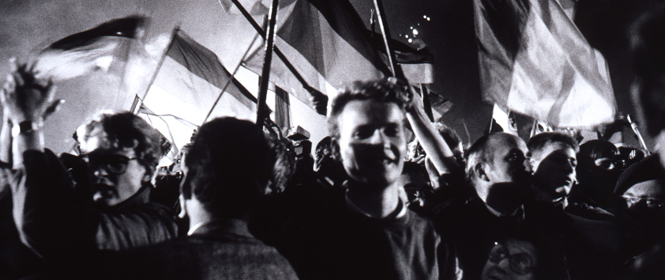
THE LANGUAGE OF REUNIFICATION
When Germany was a divided nation, the people of East and West Germany not only grew further apart in terms of ideology, but in terms of language too. Some even predicted a separation of the German language. Now, a quarter of a century after the fall of the Berlin Wall, there is little hint of this. Linguists firmly believe that this is due to the adaptability of East Germans.
46 years ago, the First Secretary of the GDR, Walter Ulbricht, predicted that the German language would soon split into East and West German dialects. “Even the language we once shared is unravelling,” declared Ulbricht in 1970, speaking before the 13th Central Committee of the GDR and alluding to the clear differences in vocabulary and expression between the two German nations. Today, 26 years after reunification, people on both sides of the former divide speak more or less the same. In 2004, linguist Manfred Hellmann expressed his belief that linguistic convergence had been achieved – due, first and foremost, to the adaptability of the East Germans.
WEST GERMAN TERMS BECOME STANDARD IN THE EAST
Whilst many commonly used words in the GDR, especially those connected with the workplace or official contexts, disappeared without a trace following reunification, some 2,000 to 3,000 words were adopted from the West. When talking about ‘frozen foods’, ‘teams’ and ‘supermarkets’, the words Feinfrost, Kollektiv and Kaufhalle were replaced by Tiefkühlfrost, Team and Supermarkt. Very few people in East Germany had heard of terms such as Konfirmation(‘confirmation’), Spielothek (‘amusement arcade’) and Hamburger (‘hamburger’), not to mention popular English loanwords such as Kids and Outfit. The East Germans also had to contend with significant political, economic and administrative changes, with the ideologically driven officialese of the GDR replaced by a new West German jargon.
The former citizens of the GDR had to make huge efforts to adapt and integrate when it came to language. Unlike their counterparts in the West: only 14 or so words and phrases from the former East Germany were adopted in the vernacular of the reunified country, including abnicken (‘give the nod’), andenken (‘to start thinking about’), Exponat (‘exhibit’) or Fakt ist(‘the fact is’). Plaste and Elaste (the old GDR terms for hard and soft plastic), on the other hand, were simply ignored in the West – along with hundreds of others.
COMMUNICATION ISSUES AFTER THE FALL OF THE WALL
In the first few years of reunification, communication issues between East and West Germans were partly attributable to the many different words and phrases used. This was particularly challenging for the East Germans. According to linguist Hellmann, they had to learn many words from West Germany – and their meaning – in the way you would learn a foreign language, as they referred to procedures or institutions that were unheard of in the GDR, such as Lohnsteuerjahresausgleich (‘annual adjustment of income tax’) and Sozialversicherungsnummer (‘social security number’). In 1993, three years after reunification, the German Studies Institute at Martin Luther University Halle-Wittenberg set up a language advice line that was extremely popular in the former East Germany.
Despite the differences in everyday use, however, there were certainly never two different German languages. After all, 94 per cent of the roughly 10,000-word general vocabulary of GDR citizens was made up of words common to both sides of the divide. Moreover, there was a pronounced difference in the GDR between official and private usage. In private, East Germans hardly spoke any differently to West Germans. Even before reunification, East Germans – unlike West Germans – were able to place their vernacular within an overall German context. Generally speaking, they knew much more about living conditions and language in West Germany than West Germans knew about living conditions and language in the GDR.
A NEW COMMON LANGUAGE
Although West Germans hardly adapted their language to accommodate their new fellow citizens, the vocabulary in the West nonetheless increased post reunification. During the process of reunification, many words were coined that were new to people in the West and the East and that were directly associated with the events of the period. These include terms such as Abwicklung (‘winding up’), Begrüßungsgeld (‘welcome money’), runder Tisch (‘round table discussion’) and Solidarbeitrag (‘solidarity contribution’), as well as pejorative new words such as Besserwessi (‘West German know-it-all’) and Jammerossi (‘East German moaner’). These and other expressions have long been part of the vocabulary of a united Germany.
The former East and West Germany have grown closer together in many areas over the past 26 years. At the same time, some differences are still marked precisely by the former border between East and West, such as economic strength, family structure and wealth. Furthermore, stereotypes about Wessis and Ossis have still not been consigned to history. According to a study carried out by the Berlin Institute for Population and Development, it will take another generation before German unity is firmly anchored in people’s minds. It has, however, long been reflected in the way they speak.